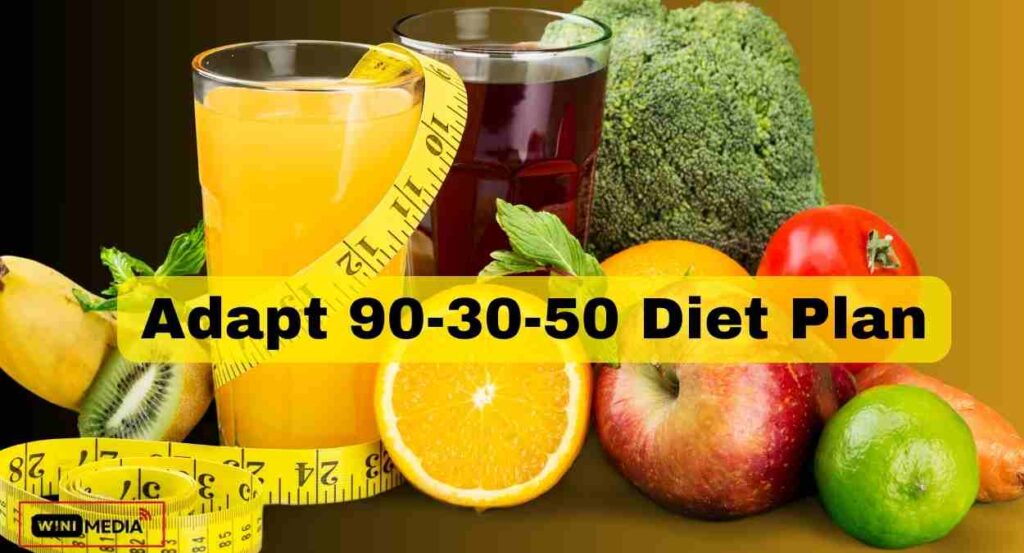{ Healthy Weight Loss, 90-30-50 Diet,90-30-50 Diet Plan, 90-30-50 diet plan for beginners, diabetes management, Muscle Building, Boosts Immunity }

In this blog post, I am going to discuss What is the 90-30-50 diet plan and how it works for your body. At the end of this article Hope you will be using it for your optimum health benefit.
The latest nutrition regimen gaining traction in fitness circles is called the 90-30-50 diet – named after its core macronutrient ratio formulation. This diet structure guides adherents to consume 90% nutrient-dense whole foods while capping 30% of total calorie intake from healthy fats and having carbohydrates comprise around 50%.
But does cramming your nutritional wisdom into three digits translate to better health? Let’s holistically examine the merits and appropriate application scope of the 90-30-50 diet to tap its benefits sustainably.
Understanding 90-30-50 Diet’s Macronutrient Balance Approach
Traditional diets focused extensively on calories – cutting carbs and fats was the shortcut to quick weight loss. But as nutraceutical science evolved, the role of what we eat gained equal importance alongside how much we eat. 90-30-50 diet was formulated in this context.
It aims to optimise all three vital macronutrients: dietary carbohydrates, proteins and fats in the prescribed consolidated ratios for fuelling the body appropriately. Now let’s decode why each target matters:
90% Nutrient-Dense Whole Foods
Emphasizing maximum nutrient-dense unprocessed produce minimizes empty calorie load while loading up vitamins, minerals and antioxidants vital for health. Think leafy greens, berries, lentils, fish etc.
Capping 30% Calories from Healthy Fats
Fats aid nutrient absorption, support cognitive health and keep you satiated. Focus stays on unsaturated fats via oils, nuts, seeds, avocados.
Maintaining 50% Carbohydrates
Keeping carbs moderate and opting for whole grains stabilizes blood sugar while providing sustained energy via fibre that processed carbs lack.
This consolidated approach ensures you don’t drastically cut any essential macronutrient at the cost of others – fueling the body wholesomely.

Evaluating Benefits of Following 90-30-50 Diet Plan
Let us discuss What incorporating the 90-30-50 diet framework offers across metrics like weight loss, metabolic health, immunity and energy regulation.
Facilitates Healthy Weight Loss
Balancing proteins, fibre-rich complex carbs and healthy fats keep one satiated preventing bingeing. Curbing calorie density fuels weight loss.
Regulates Blood Sugar Levels
Low glycemic grains minimize insulin spikes. Improved metabolism regulation helps diabetes management.
Supports Muscle Building
Adequate dietary proteins aid muscle development and faster recovery from exercise.
Boosts Immunity
High micronutrients from fruits-veggies fortify immune response to combat diseases.
Enhances Energy & Focus
A steady stream of macronutrients maintains energy for extended periods without crashes.
When incorporated mindfully aligning activity levels, a 90-30-50 diet can deliver multifaceted benefits, especially increased holistic nourishment.

Implementing a 90-30-50 Diet Plan in Daily Routine
Wondering how to put the 90-30-50 diet plan into action for your lifestyle? Some tips:
1. Structure Meals Suiting Ratio
Plan meals and grocery lists keeping a 90-30-50 ratio guide handy. Adjust serving sizes to meet daily caloric needs.
2. Load at least 4-5 Servings of Fruits & Vegetables
Emphasize produce abundance on the plate – freshly chopped veggies + fruit smoothie boosts 90% dense whole foods target.
3. Moderate Carb Intake
Limit refined carbs from pasta, bread, and cereals and opt for unpolished versions or whole grains like millet, quinoa, brown rice etc.
4. Watch Fat Quality
Prioritize plant-based sources – olive oil, nuts, seeds, avocado. Limit saturated fats via butter, and red meat.
5. Lean Towards Lean & Clean Proteins
Favour high protein options like egg whites, grilled chicken, sprouts, and lentils instead of processed meat.
6. Stay Hydrated
Drink adequate water between meals. Herbal tea infusion grants added antioxidants.
Following these broad guidelines customizing suitably to your local diet ensures optimal adherence. But remember – moderation matters more than blind ratio chasing.

Adapt 90-30-50 Diet Plan to Individual Lifestyle Factors
An often underrated aspect is factoring key lifestyle contexts, health conditions and sustainability parameters while adopting specialized diets like the 90-30-50 plan.
These are the Few examples:
Sedentary People
Can reduce overall carb % to 40 given lower activity expenditure. Increase metabolism boosting protein intake.
Chronic Health Issues
Those with diabetes or PCOS may have to monitor carb quality more strictly opting lowest GI options.
Ethical Preferences
Vegans would source plant proteins from soy, lentils, and chickpeas instead of fish, eggs or meat.
Intermittent Fasters
Condense carb servings to evening meals aligned to the feeding window for sustaining energy during fasted hours.
Hence it’s vital always to customize any diet plan aligning individual body requirements and routine practicality instead of force-fitting. The 90-30-50 diet serves as an optimal guideline delineating macronutrient balance but precision application optimizing for one’s unique lifestyle lies in expert consultation.
Summing Up Efficacy of 90-30-50 Diet Plan
The merits of the 90-30-50 diet plan lie in its scientific balance focusing on holistic nourishment and emphasizing unprocessed real foods without entirely vilifying or severely restricting any macronutrient group.
This structured freedom aids multiple health objectives –
Right from sustainable weight management and attaining ideal physique goals to combating inflammation and rectifying metabolic issues like insulin resistance or chronic fatigue.
By urging optimal carbohydrate-fats-protein ratio intake through wholesome nutrient-dense sources, the 90-30-50 diet framework banks on the wisdom innate to the body and nature. But customizing suitability based on activity patterns, life stages and genetic predispositions is key.
While no universally perfect diet exists, this regimen does mark an evolved milestone. At its core, the 90-30-50 diet acknowledges that caring for health demands caregiving to individuality – not just calories.
Watch The Web Story on 90-30-50 diet
FAQs – 90-30-50 Balanced Diet Plan
Q1. What is the 90-30-50 diet structure?
A1. The 90-30-50 diet recommends:
- 90% intake from nutrient-dense whole foods (fruits, vegetables etc)
- 30% daily calories from healthy unsaturated fats (nuts, avocado etc)
- 50% calories from low GI unprocessed complex carbs and fibre (quinoa, millet etc)
Q2. What are the benefits of a 90-30-50 balanced diet?
A2. Benefits include steady energy levels, improved metabolism markers, muscle-building support, weight management and higher micronutrient intake for immunity boost.
Q3. How to plan meals in a 90-30-50 diet format?
A3. Plan balanced meals keeping the macronutrient ratio framework in mind. Prioritize lean proteins, and fibre-rich grains and produce abundance suiting caloric needs and activity levels.
Q4. Who should avoid a 90-30-50 diet plan?
A4. Those with special metabolic conditions or food intolerances should take expert guidance before starting a 90-30-50 diet. Customization aligning health status is vital.
Q5. Does the 90-30-50 diet allow for flexibility?
A5. Yes, the beauty of 90-30-50 lies in its adaptability to various preferences like veganism or conditions like diabetes once ratios are balanced keeping individual context in mind.
Q6. Can this diet help in sustainable weight loss?
A6. Yes, by curbing caloric density focusing on real foods, improving metabolic regulation and keeping one satiated – a 90-30-50 diet aids gradual sustainable fat loss.
Q7. Is the 90-30-50 diet scientifically proven?
A7. While more longitudinal studies may further consolidate, the structured macronutrient balance approach has shown positive health outcomes during trials regarding holistic nourishment.
Disclaimer :
The content in this article is for informational purposes only. Before beginning any specialized diet, consult your dietitian, physician or licensed healthcare professional regarding suitability-based medical history. Their guidance takes precedence. Our organization Wini Media won’t be responsible for adverse effects arising from self-administration of dietary regimes without expert advice.
Also Read :
T20 World Cup 2024: India Set for High-Voltage Pakistan Clash at Innovative Pop-Up New York Stadium
Google And NPCI Join Hands To Propel India’s UPI Worldwide : UPI Global Launch
What Does The Odometer Of An Automobile Measure? Your Car’s Odometer Reading Explained
The Complete Guide to Transformational Vipassana Meditation
Axiom-3: Launching the First All-European Private Crew to the ISS































